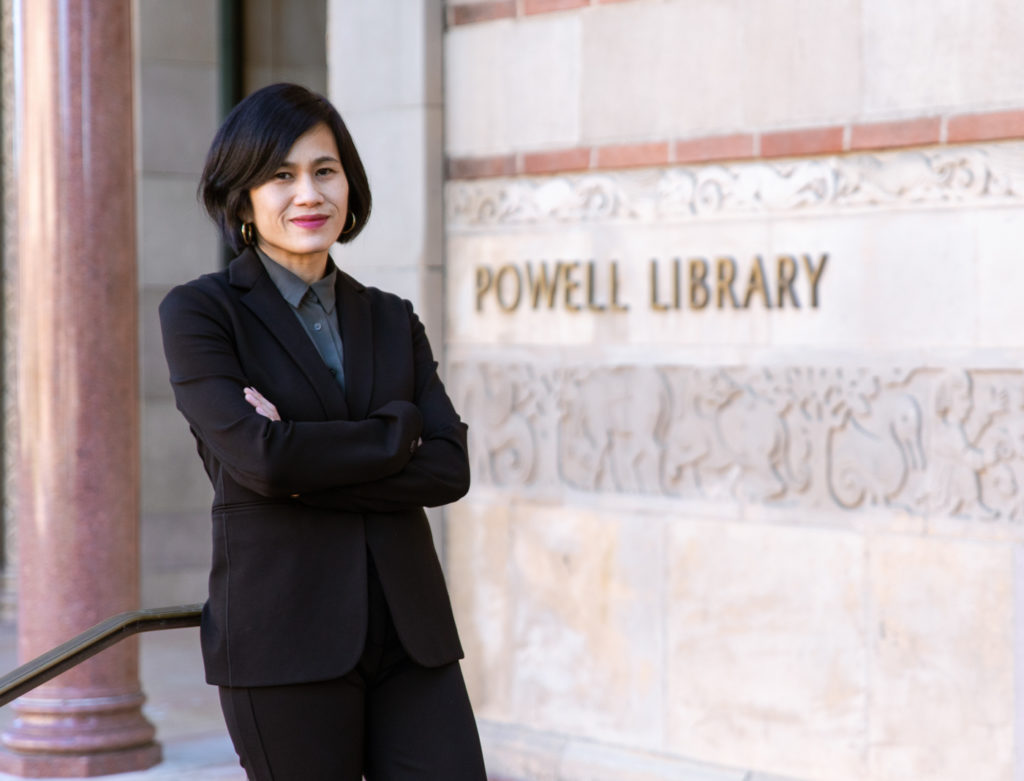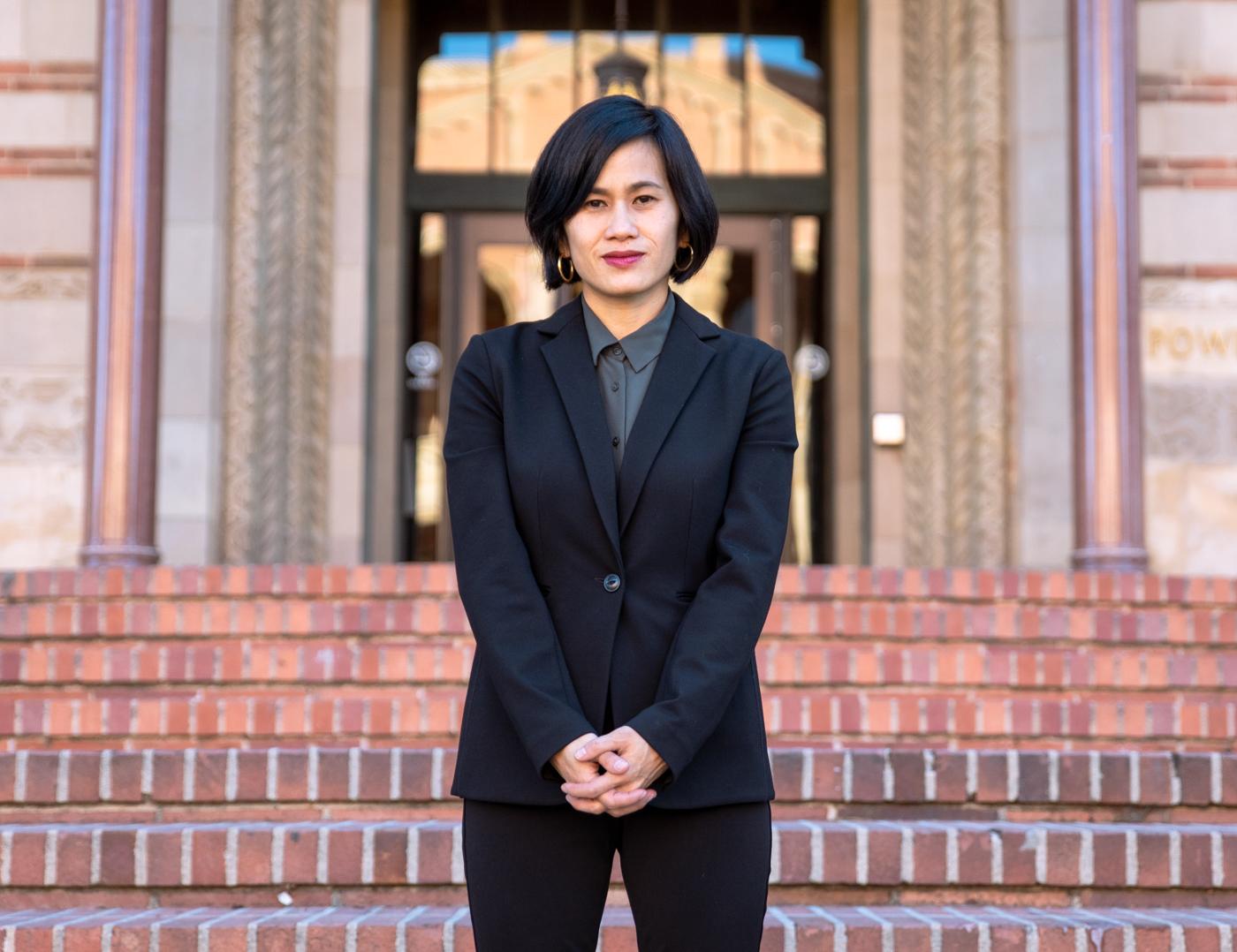New UCLA Film & Television Archive director aims to diversify collection
After graduating from UCLA in 2006, May Hong HaDuong is the first woman and person of color to head the UCLA Film & Television Archive. (Ashley Kenney/Assistant Photo editor)
By Isabella Durgin
Jan. 21, 2021 6:03 p.m.
This post was updated Jan. 28 at 7:25 p.m.
May Hong HaDuong is leading the UCLA Film & Television Archive on a new path in 2021, beginning with her notable appointment.
HaDuong is the first woman and person of color to serve as the director of the 55-year-old Archive, the world’s largest university-held collection and the nation’s second largest collection of motion pictures. After graduating from UCLA in 2006 with a master’s degree in moving image archive studies, HaDuong went on to work with a variety of organizations, including the Academy of Motion Picture Arts and Sciences. In light of her post-graduation experiences, HaDuong said she hopes to bring back new perspectives to UCLA.
“When I left (UCLA), I left with this understanding that I was given this gift to learn … not just about archiving but about cinema culture,” HaDuong said. “I was able to take that and grow, and I want to give that opportunity to future generations, not just at UCLA, but within the Los Angeles community.”

Increasing public access and education to cinema culture is central to The Archive’s history and mission, HaDuong said. One of the current access initiatives includes the Virtual Screening Room, which she said began during the pandemic and streams almost weekly. Most of the content is from its collection of films, newsreels and television shows.
HaDuong said the streaming platform will also provide a virtual space to continue the postponed 2020 UCLA Asian American Studies Center 50th Anniversary Film Festival, now occurring Feb. 19 to Feb. 21 and Feb. 26 to Feb. 28. As the incoming director, she said she wants to grow such platforms so people around the globe can experience the diverse stories The Archive has to offer.
“I really hope to bring a spirit of sharing (and) interest around the collections, underrepresented communities (and) access that are really core to my values,” HaDuong said.
Daniel Streible, the director at the Orphan Film Symposium, said HaDuong’s work on neglected media demonstrates her ability to to balance programming, logistics and film preparation. Streible, an associate professor of cinema studies at New York University, added that HaDuong’s prior responsibilities with content visibility and accessibility will translate to the presentation of different media in The Archive.
“I think she’ll do a great job of making sure that the material that The Archive preserves and collects continues to get high visibility and in new and creative ways that the digital present and future allows,” Streible said.
HaDuong has also worked with Outfest – a LGBTQ+ arts, media and entertainment organization – to increase preservation of overlooked projects, said Kirsten Schaffer, executive director at Women in Film. As the former project manager and current advisory committee member for the Outfest UCLA Legacy Project, HaDuong has worked to archive queer films which have historically been unprotected by studios and consequently often end up damaged, Schaffer said.
[Related: Outfest aims to increase accessibility to LGBTQ+ programming with streaming service]
Contrary to the general public’s belief, Schaffer said a significant portion of all films cannot be found on mainstream streaming services, which is why archives are so integral to film and culture.
“If there is not an institution that is dedicated to protecting our stories, they fade away,” Schaffer said.
The director of the Chicano Studies Research Center, Chon Noriega, said he believes HaDuong can expand access by analytically considering The Archive through both its structure and function. In particular, one of the most impactful ways that HaDuong can enhance The Archive’s mechanisms is to work closely with the staff and open them up to larger roles, Noriega said.
“What really impressed me is (HaDuong) fully understood what The Archive has been and what it is at this point, but also where it could go with the staff that are there,” Noriega said. “It really speaks to something that rarely gets talked about in terms of large institutions like this, which is, ‘how do you commit yourself to the professional development and the support of the staff?'”
The current staff has hundreds of years of experience combined, HaDuong said, and it will be an exciting, collaborative environment for her to work in as the director next month. With the other employees, she said she hopes to continue the conversation on how to describe films in culturally competent ways. And because an archive’s central work is preservation, the decision on what films to collect is a continuous one, Schaffer said.
[Related: Short film sheds light on lasting movement for abortion rights and access]
As for how to make such content decisions, HaDuong said she hopes to work with both filmmakers and communities to represent a variety of groups. For example, she said The Archive is currently working with the Packard Humanities Institute on its global collection with newsreels from around the world, spanning 27 million feet of film. And on a local scale, HaDuong said she hopes to incorporate more independent films, including UCLA student films and behind-the-scenes home movies.
HaDuong’s position with the Film & Television Archive and her deep knowledge of cinema culture suitably poises her to lead the organization in a more connected way, Schaffer said. To HaDuong, the impact of the appointment is personal to herself and others, as she will be the first woman and person of color to lead the Film & Television Archive, but she said she also wants to translate this momentum into substantial change for The Archive itself.
“The response I’ve received in this announcement has been incredibly moving, but I know that there’s work to be done,” HaDuong said. “And I know that as much as firsts are important, it’s really the legacy of what that (experience) is (that is important), after years of hard work and collaboration and partnerships.”
